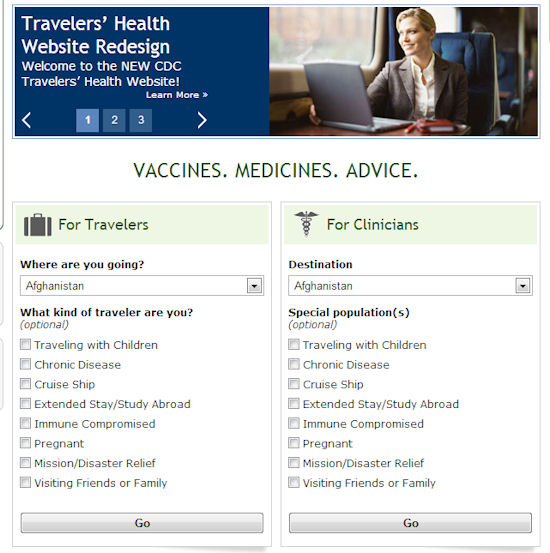5 Tips to Take the Stress out of Trip Planning
17 May 2013
Some travelers take great joy in planning a trip. They’re the ones that like to get all the details just right even if the trip isn’t tightly scheduled, they like to know their options at all times.
Other travelers find all the details to be too overwhelming – sometimes to the point that they will simply buy their tickets and leave the rest of the trip to chance.
Who has a better vacation? Who knows? Even when things go wonky, your enjoyment largely depends on your attitude, but for those who would rather see the dentist for a root canal surgery than plan a trip, here are some tips to take the stress out of trip planning.
1. Leave yourself enough time
Sure, you’ll need a shorter head start for a quicker getaway, but giving yourself enough time for any trip means that you’ll be able to:
- Research airline fares to find the best deal. Experts recommend buying your tickets within that 40- to 60-day prior to your trip for the best price, but you won’t know if it’s a good price if you haven’t seen the fares regularly.
- Locate a place to stay that you can afford. These days, you can go the traditional route and book a standard hotel room, or you can look into some more unique and/or less expensive options such as vacation rentals, home exchange, hostels, and more. Even if you’re the ‘wing it’ type of traveler, reserve your first night’s stay in each city so you can get some rest even if your flights are delayed or it was a truly uncomfortable ride.
- Visit a travel doctor, if necessary, and have enough time to complete the proper vaccinations. Some vaccinations require several shots over a period of time. Some require a blood test to check antibody levels. Some have to be in your system for an amount of time before you are safe to travel to a particular area.
On that last note, many experts recommend visiting a doctor for proper medical advice. Simply taking the word of friends who traveled there before isn’t enough. Check the CDC Traveler’s Health site and get the information you need about where you’re going.
2. Address any medical or physical concerns
If you regularly take any medications, or have a physical or medical condition, you’ll need to address those concerns ahead of time.
- Obtain enough medication to get through your trip (and account for possible delays). Depending on how long you’ll be traveling, you may need to stock up on extra medications and that can take a little time.
- Know whether your medications will cause problems when crossing the border. Two classes of medications – narcotics and psychotropics – are often problematic, but some countries also exclude medicines used to treat neurological conditions such as epilepsy and others treat sedating antihistamines as banned substances.
- Determine how you’ll replace necessary medications if yours are lost or stolen on your trip. For most travelers this means carrying a copy of your prescription and their doctor’s contact information as well as having travel medical insurance that will cover medicine that is lost, stolen, or confiscated.
- Have the physical supports you need to properly care for old injuries or chronic conditions such as a sore knee that occurs when walking for long periods. Only you will know these unique things about your body, and having the brace or shoe insert, or other item you need can make all the difference after a long day of exploring.
See our 6-Step Checklist for Traveling with Medications for more information.
3. Pack a travel medical kit and medical record portfolio
Even expert frequent travelers fail to do this and it puts them at significant risk if something should go wrong. Many travelers think, “Hey, it won’t happen to me.” and they’re right … until it does.
If you cannot speak for yourself – especially if you have a medical condition – or you don’t know the local language that well, you need to have something on your body at all times that can help emergency medical teams know how to treat you. Making their job easier will improve your odds of survival.
See 4 Tips to create a simple, effective travel medical portfolio and don’t forget to include the information for each of your kids if they’re coming along.
In addition, it’s important for travelers to recognize that some places in the world don’t have a big full-service pharmacy on every corner. So, having the basics you might need packed in your travel medical kit can make a big difference. If you’re traveling with kids, having their
See What’s in your Travel Medical Kit for the bare minimum travelers should carry in their travel medical kits.
4. Know how to find medical help on the road
It’s been estimated that nearly 20% of all travelers get sick each year and over 5% need emergency medical care while traveling abroad. Those numbers aren’t high, but if it happens to you those numbers won’t matter. Knowing how to find qualified medical help on the road is important no matter where you’re traveling. If you’re traveling with kids, it can be even more critical.
If you’re traveling to one spot and not roaming all around the globe, do a little research ahead of time to find out if your health coverage will work where you’re traveling. Then, find out the location of the closest emergency room and store that to take with you. If you’re hitting a lot of different destinations, you may have to do some of the research as you go.
Of course, there are a couple of highly recommended ways to be better prepared for medical emergencies when you’re traveling, and those are:
- Have travel medical coverage and call your travel assistance services representatives for help finding qualified medical care where you are. The right travel insurance will pay for your medical treatment, emergency transportation, and even a medical evacuation when necessary.
- Join IAMAT, the International Association for Medical Assistance to Travelers. IAMAT members have online access to qualified and affiliated doctors and clinics in over 90 countries and their health professionals will speak English.
For more details, see our article on Finding Medical Care on the Road and in a Hurry.
5. Pack like a travel pro
Learning to pack like a travel pro is critical to having the items you need without a lot of extra weight in your luggage. While the primary goal of travel packing is simple, it’s more difficult to do when we’re forced to choose between having our favorite things and going without them.
The key to being a safe and ready traveler is self-sufficiency and learning to pack like a pro means:
- Planning ahead – start at least a few days (preferably a week) prior to your trip
- Paying attention – filling all the empty spaces, layering and/or rolling items, etc.
- Packing a lock – even if you don’t lock it in transit, you’ll want to lock it when you leave your lodgings
- Distributing items appropriately between your carry-on and checked luggage
- Sorting your travel documents, insurance coverage, itinerary, etc.
- Copying your passport identification page and leaving a copy with a friend
- Taking a picture of the contents of your luggage (for insurance claim purposes)
Overpacking can cost you quite a bit of money. You already know that the airlines charge for each piece of checked luggage (unless your rewards card gets you out of that situation) but many airlines are now starting to charge for carry-on luggage. Luggage that is considered ‘overweight’, and each airline’s limit varies, means more money out of your wallet. Packing a bag that’s too heavy for you to handle on your own also puts you in a bind if you arrive at a destination where there are no porters.
See our 7 Tips to Lighten your Load on your Next Trip for the packing tips gathered from experts.
Damian Tysdal is the founder of CoverTrip, and is a licensed agent for travel insurance (MA 1883287). He believes travel insurance should be easier to understand, and started the first travel insurance blog in 2006.


